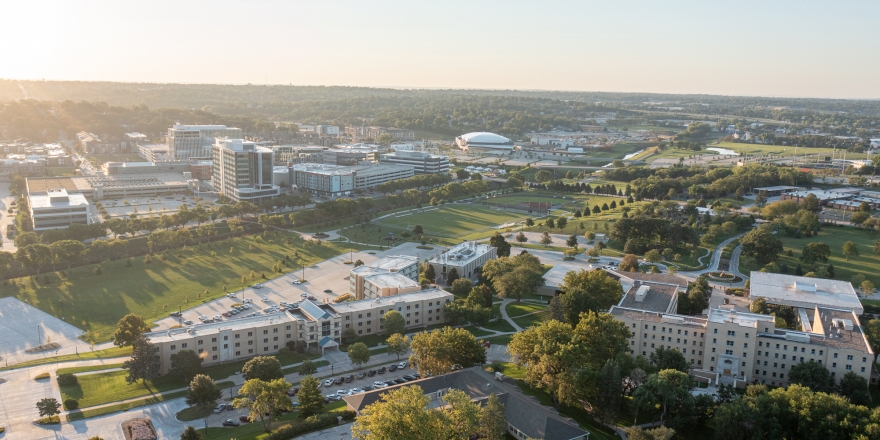
President's Statement in Response to Racism in our Country
Dear CSM Faculty, Staff, Students & Community:
I was a young woman in the ’60s. My ideals were born during the civil rights struggles and the protests to end the Vietnam War. My heroes were Dorothy Day, a Catholic peace activist, who started a string of homeless shelters in New York in the 1930s; Dr. Martin Luther King, who led the overthrow of the Jim Crow laws of the South; and Thomas Merton, a Trappist monk, who had a mystical experience running errands in Louisville, Kentucky, the town nearest his monastery. He realized he could never be truly separate from others, even if they were strangers and even if he lived only with other monks. One cannot leave the world; there is simply no place else to go.
Thus, I am relatively liberal, and as a woman in a Catholic religious community, the Sisters of Mercy, I am inspired by the life of Jesus and our founder, Catherine McAuley, to envision a just world for people who are poor, sick and without access to education. My ministry in education provides a means to move that vision closer to reality. A good education calls forth the best in people, allowing them to hone their gifts and their talents so that they might not only participate meaningfully in the economy but also actively contribute to their communities, realizing that the common good is the ground on which those who are pushed to the margins might depend.
I would never have considered myself a racist. I wore having a black brother-in-law as a badge of understanding. I remember the discrimination my sister and he experienced even from within my family and I was proud of my resistance to it, participating in their wedding and inviting them to my home. At CSM I have strived to create a welcoming environment for all students. Then, a few months ago, at the behest of our Director of the Office of Diversity and Inclusion, I read White Fragility: Why It’s So Hard for White People to Talk About Racism by Robin DiAngelo. Her argument is that essentially, all white people are racist and what keeps us from recognizing such is our white privilege. I’m rarely uncomfortable in a group. It would never occur to me that the police would be called because I asked someone in a park to leash their dog. While I am embarrassed because I know I have been speeding when I see red lights flashing signaling me to stop my car, I do not fear the police. I was born privileged into a middle-class home to parents, who, while they never went to college, drilled into us the value of education. Indeed, my siblings and I all have advanced degrees. We are good people; we do good things. But whiteness has profoundly shaped our lives, and the lens through which we look at life. Just as being black has profoundly shaped the lives of those whose skin color is not white and the lens through which they see a police officer or whether or not they will be comfortable in a group. DiAngelo argues that being a good person and being complicit with racism is not mutually exclusive. Racism doesn’t have to be conscious or intentional in order to exist. It is in the air we breathe and those of us who are white consciously and unconsciously perpetuate it.
Reading the book pushed me to do lots of reflection. Over the years, I have heard from black, Asian and Hispanic students about “micro-aggressions,” that is, subtle and most likely unconscious choices occurring on campus that marginalized their voice. Students in general are often cautious in their critiques because of the perceived power faculty and staff have. I think black and brown students might be even more cautious than most, given the culturally negative messages they’ve received since childhood. To respond to this and to the call within our society to become more open to diversity, we had in our VISION 2021 Strategic Plan a commitment to become an Inclusive Campus, holding a staff development day on unconscious bias and various faculty and staff workshops on inclusive pedagogies. Our Black History course will be taught more frequently. The Office of Student Leadership and Organizations authorized a student-led Rainbow Alliance to support LGBTQ students and organizations for Black Students, Latina Students and a Multicultural Club. While these are good acts and they have good ends, in many ways they are tokens; that is, it’s what people today would expect at a college or university. But we need to look deeper. We need to ask if our black and brown students feel welcome and safe here. We need to grapple with the questions of why we do not have more black students and why those who do enroll do not persist in the same numbers as our white and Hispanic students. Why don’t we have a critical mass of role models among our faculty and staff for students of color? We need to look at all of our policies and procedures and ensure that they are not unconsciously biased toward those of color.
I was still in this period of reflection, trying to sort out what actions would lead to greater understanding about how to respond to DiAngelo’s argument when the torture-murder of George Floyd was graphically depicted on the news. The protests began. Numerous names of blacks killed by police in confrontations for little cause began to roll across the screen. I knew about Freddie Gray and Tamir Rice and many of the others, but seeing them cumulatively shocked me. “I can’t breathe” became the mantra for noting the anguish of black dignity being denied over and over again.
The protests continue.
As so they should. We should all be protesting. As Pope Francis says: “we cannot tolerate or turn a blind eye to racism and exclusion in any form and yet claim to defend the sacredness of every human life.” Black lives matter. We need to protest now. Protests are designed to call attention to that which is wrong. And, so much is wrong. All our systems are infected with racism. It is not just the criminal justice system or the police. There are disparities in health care, education, housing, the list could go on. Everywhere we turn, we realize that black people have been disadvantaged through systems designed for the privileged. And, those of us who are white are privileged if only because we are more comfortable in this society.
We cannot turn a blind eye and claim to be followers of the God of Moses and Jesus, the God who hears the cries of the poor and calls upon us to love one another. But, what can we do? Listening will be a good start. I want to listen to our black and brown students, staff and faculty and let them tell their stories of what they have experienced, of how they have been hurt by racial slurs or by micro-aggressions or how they experienced systems rigged against them. I want to hear about what their mothers told them when they were young about prejudice to shelter them from hurt feelings and real harm. These things are foreign to those of us who are white. I am sure the stories will make me uncomfortable, but I want to listen.
I invite you to listen with me. First, reflect on how your ideals were formed. Who influenced you? Who called you forth to be the good person you are? When did you realize there was racism? And, how are you responding in the light of the George Floyd moment? Who are you willing to listen to in order to learn more about the challenge it is to be a black or brown person in the United States? I invite you to be uncomfortable along with me. Together, I trust, our listening and reflection will lead us to join the protest and take actions that make a difference.
As President of College of Saint Mary, I will ensure that we host opportunities during which our faculty, staff and students might become more educated about racism, its history and prevalence throughout our society. Those already planned include the following:
- On August 6, CSM leadership will begin a year-long, intensive program led by Inclusive Communities, to help us understand our role as leaders in creating a culture of hospitality at our institution. Inclusive Communities’ new program, Project READI, is a leadership program focused on diversity-awareness. The team from Inclusive Communities will guide CSM’s leaders to evaluate identities and systems of advantage, social identities, cycles of socialization, and competencies in order to strategize ways to improve our campus culture to be more inclusive and equitable for all students, staff, and faculty. We will identify the systemic biases that hold us back from living our core values as fully as we can, and work throughout the institution to dismantle those structures.
- In conjunction with the Library, the Office of Diversity and Inclusion will host discussions of the book White Fragility: Why It’s So Hard For White People to Talk About Racism by Robyn D’Angelo. All faculty, staff, students and alumnae will be invited. The schedule for the discussions is as follows:
- Chapters 1 -4: September 11, noon to l:00 p.m. or September 25, noon to 1:00 p.m.
- Chapters 5 – 8: October 9, noon to 1:00 p.m. or October 23, noon to 1:00 p.m.
- Chapters 9 – 12: November 6, noon to 1:00 p.m. or November 20, noon to 1:00 p.m.
- We have added a public web page: CSM.edu/Inclusive with our statements of commitment and resources for faculty, staff, students, and alumnae. As we gain more insights and make decisions about future actions, this page will carry news of such.
- We will establish a President’s Advisory Council on Diversity, Inclusion and Equity made up of community leaders, board members, alumnae, faculty, staff and students. They will be invited to be a sounding board for our efforts and, hopefully, challenge us to look deeper into how we might dismantle any systemic or structural racism within the campus.
Our protests will be a marathon, not a sprint. There is much work to do within CSM as well as within our society. We are an amazing College of Saint Mary community and each year we welcome a new group of students whose hope for the future inspires us to our best work. I trust that we can, to paraphrase the book of Isaiah, remove the chains of oppression and the yoke of injustice, and let the oppressed go free. The listening, the reflection, the action must allow all within and beyond our community to finally breathe.
Dr. Maryanne Stevens, RSM
President
College of Saint Mary











